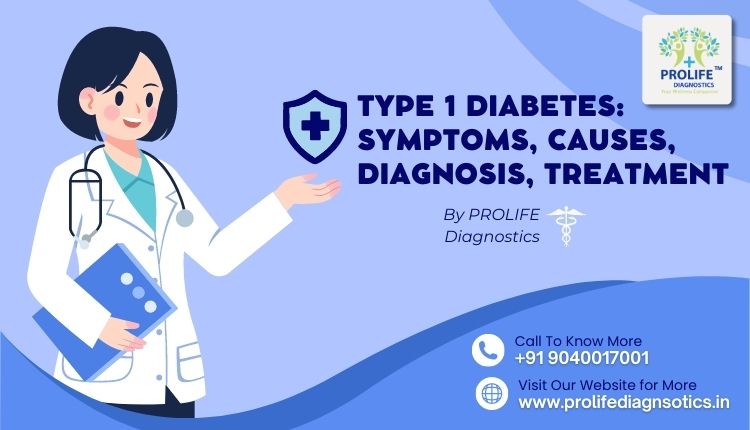- Plot No. 361/3074 & Plot No 437/3134, Patrapada, BBSR
- +91 9040017001
- +91 8630400500
July 26, 2023
Type 1 diabetes, also known as juvenile diabetes or insulin-dependent diabetes, is a chronic autoimmune condition where the body’s immune system attacks and destroys insulin-producing beta cells in the pancreas. Without sufficient insulin, the body cannot regulate blood sugar levels effectively. Understanding the symptoms, causes, diagnosis, and treatment of Type 1 diabetes is essential for managing the condition effectively and leading a healthy life.

>> Frequent Urination: Increased thirst and urination are common early signs of diabetes. The kidneys try to flush out excess sugar from the bloodstream, leading to more frequent urination.
>> Unexplained Weight Loss: Despite increased appetite, individuals with Type 1 diabetes may experience unexplained weight loss due to the body breaking down muscle and fat for energy when it cannot utilize glucose properly.
>> Fatigue and Weakness: The body’s inability to convert glucose into energy can lead to persistent fatigue and weakness.
>> Excessive Hunger: The lack of insulin prevents glucose from entering cells for energy, leaving the body starved for fuel, leading to excessive hunger.
>> Blurred Vision: High blood sugar levels can affect the lenses in the eyes, causing temporary changes in vision.
>> Irritability and Mood Changes: Fluctuating blood sugar levels can impact mood and lead to irritability or mood swings.
The exact cause of Type 1 diabetes remains unknown, but it is believed to result from a combination of genetic and environmental factors. Some potential causes include:
>> Genetics: People with a family history of Type 1 diabetes have a higher risk of developing the condition.
>> Autoimmune Response: The body’s immune system mistakenly attacks and destroys insulin-producing beta cells in the pancreas.
>> Environmental Triggers: Certain viral infections or environmental factors may trigger the autoimmune response in susceptible individuals.
Diagnosing Type 1 diabetes typically involves the following steps:
>> Medical History and Physical Examination: The doctor will inquire about symptoms and perform a physical examination to check for signs of diabetes.
>> Blood Tests: Blood tests measure blood glucose levels, and a glycated hemoglobin (A1C) test provides information about average blood sugar levels over the past few months.
>> C-peptide Test: This test measures the level of C-peptide in the blood, indicating how much insulin the body is producing.
>> Autoantibody Tests: These tests check for the presence of autoantibodies associated with Type 1 diabetes.
Type 1 diabetes is a chronic condition, and the primary goal of treatment is to maintain blood sugar levels within a target range. The key components of treatment include:
>> Insulin Therapy: Since the body cannot produce insulin, insulin therapy is essential to regulate blood sugar levels. Insulin can be administered through injections or insulin pumps.
>> Blood Sugar Monitoring: Regularly monitoring blood sugar levels allows individuals to adjust insulin doses and make lifestyle modifications as needed.
>> Healthy Diet: A balanced diet, low in added sugars and carbohydrates, is crucial for managing blood sugar levels.
>> Physical Activity: Regular exercise helps improve insulin sensitivity and overall health.
>> Education and Support: Diabetes education and support groups can help individuals learn about managing the condition and cope with its challenges.
>> Continuous Glucose Monitoring (CGM): CGM systems provide real-time glucose readings, allowing for better control and management of blood sugar levels.
Type 1 diabetes is a chronic condition that requires lifelong management. Understanding the symptoms, causes, diagnosis, and treatment options is crucial for effective management and improved quality of life. Regular medical check-ups, adherence to treatment plans, and a healthy lifestyle can empower individuals with Type 1 diabetes to lead fulfilling lives while successfully managing their condition. If you or a loved one experiences symptoms of diabetes, consult a healthcare professional for proper evaluation and guidance.
Copyright © 2025 Prolife Diagnostics | All rights reserved. | Managed By WebOpTech Solutions
WhatsApp us